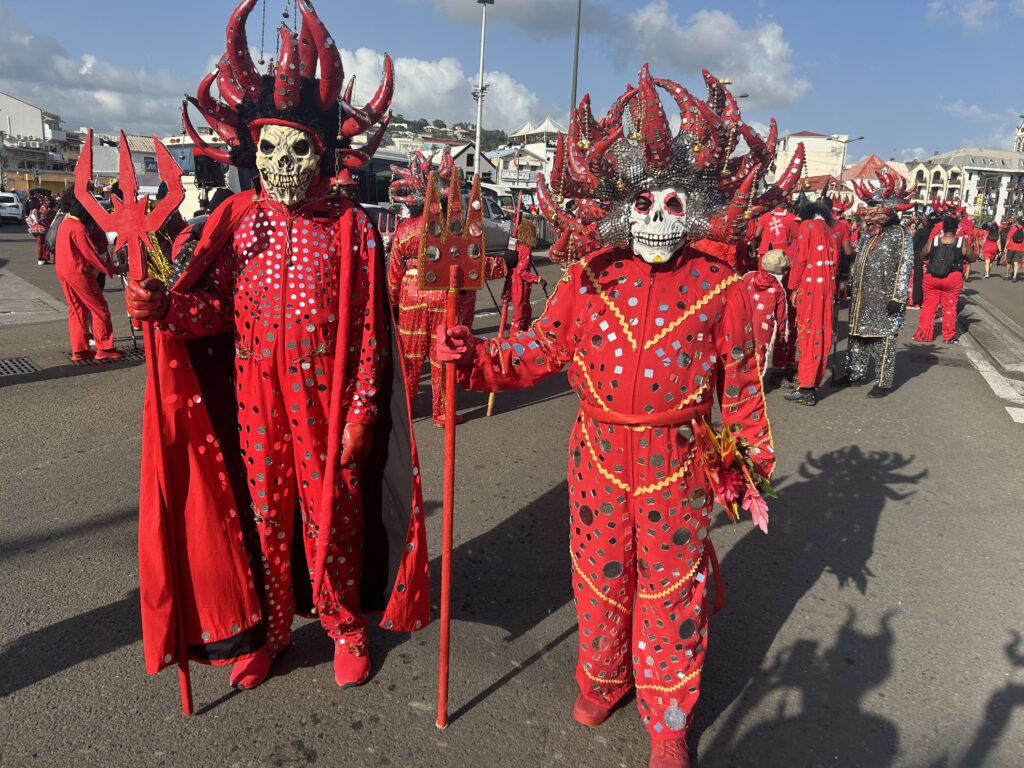This post is part of our Research Initiation Scheme for 2024-2025.
On Wednesday 16th October 2024, for Black History Month, Professor Emily Zobel Marshall gave a talk on her research and involvement in carnival and its role in society. Her talk, ‘The Power of play: Comparative Caribbean Carnival Cultures from Leeds to Martinique’ took us on a journey explaining the beginnings of Caribbean carnival culture through to its worldwide impact today.

Professor Zobel Marshall, being ‘Martinican royalty’ (according to Professor Maeve McCusker who chaired the talk) due to her famous grandfather, spoke briefly about her connection with Martinican author Joseph Zobel, and how this lineage had influenced her interests and research from an early age. Although an esteemed academic, Professor Zobel Marshall explained how her research into carnival culture was an endeavor to ‘blur the lines between academia and art’ through various projects. She spoke of this breaking down of barriers between the academic and artistic worlds and detailed just how important that is for her.
The beginnings of carnival culture across the Caribbean islands, according to Professor Zobel Marshall, started as something of a mélange culturel, or cultural mixing. She spoke of the initial introduction of the masquerade (today known familiarly as ‘mas’) as hybrid cultural form – a fusion of the religious rituals of French Catholic colonisers and the musical and performance traditions of enslaved Africans. As a form of resistance, enslaved peoples further developed their own version of the masquerade where plantation owners could be mocked and ridiculed, giving power to the disempowered.
Cultural retention was a key aspect in the foundations of Caribbean carnival culture; Professor Zobel Marshall demonstrated how the preservation of West African traditional stories involving various tricksters and masquerade characters evolved into the traditional mas that we still see today. This cultural retention was also an initial mode of resistance and independence against active, and later, residual colonialism. Being based on folklore, tradition and shared experiences are closely linked to identity, and for those playing these roles, it is a truly metamorphic experience.
Professor Zobel Marshall described Caribbean carnival celebration as being a time where roles are reversed, the world is flipped and those in power can be mocked. Caribbean carnival culture, although born from a history of oppression, is a time of liberation. Yet, whilst carnival is a freeing time, it is important to note, according to Professor Zobel Marshall, that once the celebrations have finished and people have ‘let off steam’, the status quo and authoritarian regimes can be reinforced. Due to this, it is important that carnival today continues to be a space to critique political and social ideals.
One aspect of carnival culture that I had not thought of before this seminar was the celebration of ‘jouvay’ or ‘j’ouvert’, a term coming from the French jour ouvert meaning the beginning of the day, which is typically celebrated through decorating the body with mud, coloured paint and oil. This part of the seminar was particularly captivating as Professor Zobel Marshall also presented various traditional masquerades seen on the streets of Caribbean carnival. She discussed the misconceptions of carnival culture and showed us the evolution of mas, explaining the contrast between traditional and ‘pretty’ mas (sequined, feathered carnival costumes).
Particularly interesting were the connotations associated with various traditional mas such as the ‘Jab Molassie’ character, stemming from the French word diable. It was fascinating to learn about the process and presentation of this character. Representing the burning of the cane fields or an enslaved person who died by being thrown into a vat of boiling molasses, those who play these characters cover themselves in engine oil or molasses to frighten others. Professor Zobel Marshall highlighted how these characters are supposed to be uncomfortable and challenging and how they all highlight folktales stemming from West African stories or a lived experience rooted in the sufferings of plantation life.
To finish off, Professor Zobel Marshall reminded us that whilst carnival is about play and freedom of expression, it is deeply rooted in serious and political intentions. Using the metaphor of a phoenix rising from the ashes, she described the act of mas as taking what you have and making something incredible out of it. Today, Caribbean carnival’s influence has gone global. What began on a small collection of Caribbean islands, has now become one of the most well-known forms of cultural celebration across the globe. From Martinique and Trinidad to Leeds and Notting Hill in London, we really can see Caribbean carnival influence all around the world.
Report by Ailish Williams, final-year undergraduate in English and French.
Editor’s note: Professor Emily Zobel Marshall delivered this seminar as part of Black History Month 2024. Her visit to QUB, during which she also spoke to final-year undergraduates and MRes students as part of the Caribbean Cultures optional module led by Professor Maeve McCusker, was supported by the Core Disciplinary Research Group in Modern Languages as well as the School of Arts, English and Languages Education Fund.